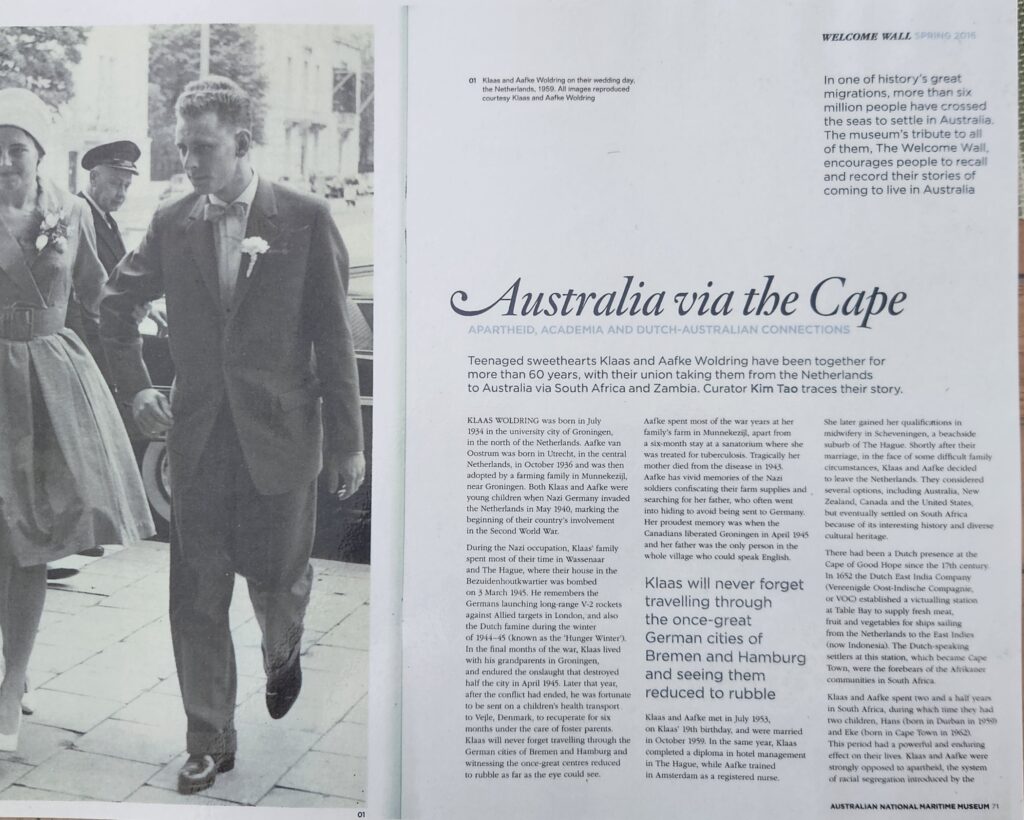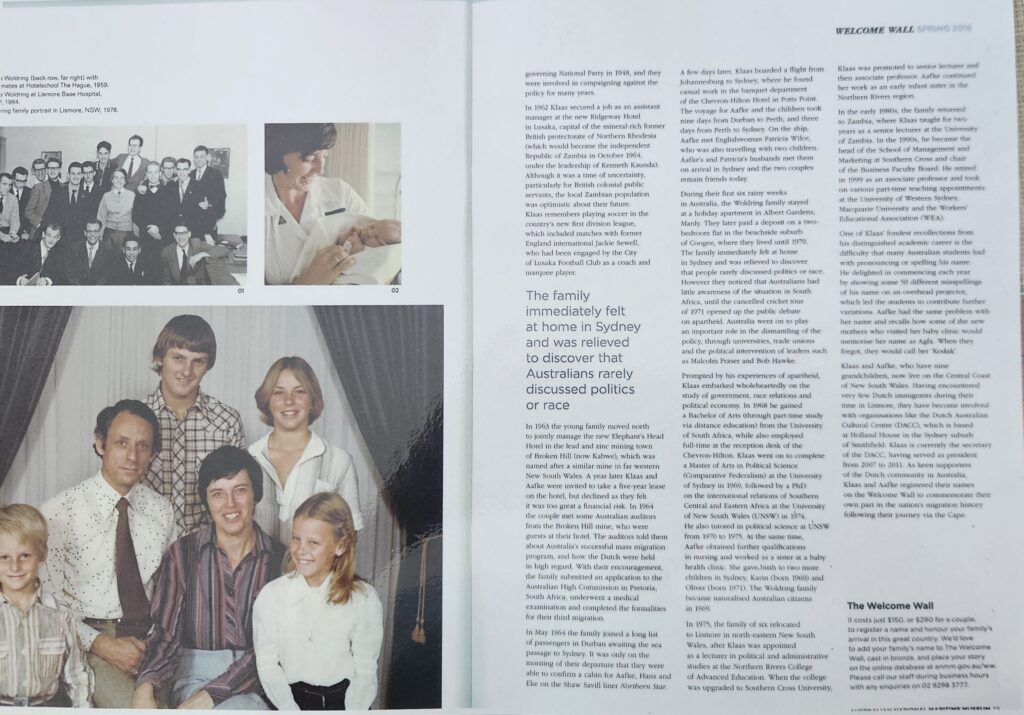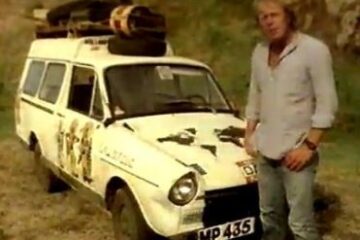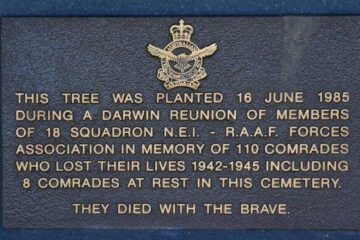This article is about Associate Professor Klaas Woldring, a retired academic and longtime member and board member of the DACC. The article contains a short biography of Klaas, and outlines some of his academic work and his interests in retirement.
Biography
Klaas Woldring was born on 2nd July 1934 in Groningen. He went to high school there, completed two years’ compulsory military service, worked in first class hotels in Amsterdam and Noordwijk and completed the Hague Hotel Management school before migrating to South Africa with his wife Aafke, a registered nurse.
He met Aafke van Oostrum in 1953 who was born in Utrecht and they married in 1959. He writes:
After two years in South Africa, we moved to Northern Rhodesia (renamed later Zambia) and worked here from 1962 to mid-1964 in hotel management, a year as assistant manager in the Ridgeway Hotel in the capital Lusaka and the second year as managers/licensee of the Elephant’s Head Hotel in Broken Hill, later renamed Kabwe, 80 kms north of Lusaka. This was a period of negotiations towards Zambia’s independence, a far more enlightening time than the two years spent in Apartheid South Africa from December 1959 to early 1962. That period entirely politicised me. Basically, this started when the Sharpeville massacre happened, three months after we arrived in South Africa. We realised what the brutal reality of the system was all about. I initially worked in the Edward Hotel, Durban and later a year in the Netherlands Club – essentially a good restaurant in Cape Town. Nevertheless, I also started part-time academic studies via the distance University of South Africa, Pretoria. The Ridgeway Hotel, Lusaka was very new and well-constructed. Broken Hill, in Northern Rhodesia (later named Zambia) was actually named after Broken Hill in Australia. Apparently because it had the same or similar mines.
In Broken Hill (Zambia) , where we managed a small but busy new hotel, owned by the Northern Rhodesian Breweries, we met four Australians from Sydney, just prior to Christmas 1963. They were auditors of the mines in Broken Hill which were, apparently, part owned by Australian companies. They were guests in the hotel.
Just at that time the Breweries asked us if we were interested in leasing the hotel for five years. We were not really as it meant quite an investment and potentially a poor return because with independence on the way many of the British settlers could (and did) return to the UK. We seriously considered returning to the Netherlands but one day we had breakfast with these Australian auditors, a friendly easy-going team, and they said when we discussed our future options “what is wrong with Australia? There is less than 1% unemployment there and the Dutch migrants are well regarded”. We were interested.
I made a short trip to contacts in Perth and, although there was little opportunity there for me in the few hotels there, the overall impression of Australia and the optimism of our contacts there was highly positive. So, that’s why we moved in May 1964 to Sydney. I soon found work in the Chevron Hilton Hotel, Potts Point (then quite new also),where I worked four years in the Reception, while continuing academic studies, all part-time, at UNISA and later Sydney University. So, at least the experiences in South Africa had that positive effect!
Aafke was a registered nurse before we left the Netherlands and completed a Karitane course here in Sydney and then became a very busy Early Infant sister in Sydney and later in Lismore.
We moved to Lismore to the Northern Rivers CAE in 1975 which later became the Southern Cross University. Our very first year there was greeted with a, you guessed it flood, not as serious as the most recent one (2022) but with staff of the College canoeing around the city and old College buildings. Photos of this demonstration which were sent to the Federal Government with the message that new premises needed to be built soon, and higher-up – which actually happened a few years later.
In 1978 the Federal Government limited the number promotions from Lecturer to Senior Lecturer at Colleges of Advanced Education and this limited my chance of promotion.
Very sensibly management then encouraged staff to work in developing countries if they could find a possibility for a short contractual period for that reason. I was actually quite keen to return to Southern Africa to assist the Anti-Apartheid Movement in some way outside South Africa itself. I applied in Zambia and received an offer to move to Lusaka to the new University of Zambia (UNZA) as a Senior Lecturer for two years. Aafke and I decided to take that up, the younger two children going with us, leaving the older two at University and boarding there. After all my Ph. D. was about the Apartheid issue and the growing international ramifications of the movement. Lusaka had become the centre of Liberation movements in Southern Africa. It certainly was quite an experience, although at a local salary. We were there from mid-1979 – mid 1981, a two-year contract. When we came back from this second period in Zambia, the new buildings in Lismore were nearly ready (1981). We had also learned what “development culture” meant in practice and, surprisingly, what reverse development culture meant, once back in Lismore. Unbeknown to us on arrival in Zambia, it was not really a safe place due to very high unemployment. Interestingly though, the country had been adopted as a “Development Country” by the Netherlands and we encountered several Dutch academics, the best known of them Professor Lolle Nauta from our hometown in the Netherlands, Groningen. Altogether it was a most interesting period, also for our two young children at the new International School.
When I we arrived in Lismore, initially in 1975, the College had 800 students, when I retired in 1999 there were 16,000 students. In the last few years I was Head of the School of Management in the Business Faculty and participated in our Distance MBA program also offered in Shanghai, Hong Kong, Kuala Lumpur, PNG, Solomons Islands and NZ. Southern Cross University’s growth was truly phenomenal, by 1990 it had become the largest employer in Lismore. One could say it growth was in a sense perhaps too quick. Vice-chancellors tended to be keen initiators of new types of courses and deliveries. The demand for courses was certainly enormous. The University also grew by decentralising away from Lismore in various ways, including to the Gold Coast, and by an extensive and well -organised additional Distance Education system.
In my retirement I reflected back on various political developments I have been part of. In my opinion there is now a lot of work to be done in Australia at the political and governance levels. Major system changes are needed here. We hear now that Australians want “to do politics differently”. That IS very interesting. The Westminster conservatism may finally be tackled and replaced by more appropriate structures and homegrown values; I think it can be done.


Historic Maps
I am not a professional specialist on old maps but my interest was greatly stimulated by the exhibition in Canberra end 2013 – beginning 2014 – which I attended twice with associates of the Dutch Australian Cultural Centre and the Australia on the Map Committee established in Canberra.
See: Historic Maps of the Explorers
New Book: A Vision for Australia – 2025
Australia stands at a crossroads.
Following the Albanese Government’s 2025 election victory—won with only 34.7 per cent of the primary vote—this book argues that Australia’s democracy no longer reflects the diversity and aspirations of its people. A Vision for Australia calls for bold, structural reform: proportional representation, a modern and adaptable constitution, and a renewed focus on civic education.
Drawing on historical precedents and international governance models, the book explores how outdated systems have failed to keep pace with social and political change. It addresses key national challenges—the collapse of the Voice referendum, the housing crisis, and the dominance of major parties—while highlighting the growing influence of independents and Greens as signs of a deeper democratic transformation.
More than a critique, A Vision for Australia offers a roadmap toward a fairer, more inclusive democracy that empowers citizens rather than institutions. It is both a warning and a call to action for those who believe Australia can, and must, evolve.
Available now for a limited time at $3.99 Au
Where to buy
Amazon Kindle, Kobo and Apple iBooks
Publications
The six mostly short books I wrote in my retirement may assist in this process. Five were self-published by BookPod/Amazon, Melbourne.
- AUSTRALIA, Republic or US colony? Lulu POD 329 pp. 2005
- How about OUR Republic? BookSurge, Melbourne, 2006
- Australia Reconstructed, BookPod/Amazon, 2013
- Beyond Federation – Options to renew Australia’s Constitution, BookPod/Amazon, 2015 (editor and contributor with others)
Yes, we can…….rewrite the Australian Constitution,
- Our later Zambian experience was very different. The NRCAE BookPod/Amazon, 2018
- How to improve Australia’s Democracy – Breaking the vicious cycle, BookPod/Amazon, 2020
Earlier books published:
Business Ethics in Australia and New Zealand in the Private and Public Sectors, Contributor and Editor, Essays and Cases, Nelson ITP, Melbourne (1996)
Beyond Political Independence – Zambia’s Development Predicaments in the 1980s, Mouton, Berlin – managing editor and principal contributor (1984)
Also, around 40 articles in academic journals, some on politics in Africa and, more recently, on management, industrial relations, human resource management and politics in Australia.
Copies of the books of after 2000 will be placed in the DACC Library.
I have been associated with the DACC since 2000 as a board member, some years as President and later as Secretary. Recently, I resigned as Secretary but will continue as a board member.
November 2022
Discussion on a new electoral system with lessons learned from the Netherlands
Associate Professor Klaas Woldring has written a book on How to improve Australia’s Democracy (see below). The book’s abstract is as follows:
The book is a progressive statement advocating major governance system change for Australia. There is an Introductory Chapter which sets out why the pandemic has (1) opened up a situation conducive to considering major political system and constitutional changes ; (2) why piecemeal tinkering, the customary ineffectual approach to governance system change, must be abandoned; (3) demonstrates that governance systems are interconnected so that major reforms need to be discussed with that in mind; (4) that decentralisation in Australia is not happening, to the contrary.
He also launched a Facebook page on this topic.
According to Klaas: The principal objective is to explain the advantages of a new electoral system for Australia. The recommendation of this Page essentially is to replace the Single Member District system with Proportional Representation – Party List, used in 85 other countries, especially European countries although New Zealand has introduced it as well in 1996. We have serious problems with our governance systems in Australia. The current electoral system is a major contributor to these problems. The emergence of a large group of Independent candidates is a sign of this dissatisfaction. However, it is quite difficult to win an Independent seat in the current two-party system which benefits the major parties greatly but some may succeed. However, a major reform is needed in the longer term. This requires an educational campaign. The Internet allows us to give this a start.
Click here for more background information.
On the housing problem
In July 2023, Klaas was inspired by the high percentage of government owned rented houses/apartments in the Netherlands (34% by far the highest of a long list according to an Australian source) to write an article about the housing problem in Australia.
This is not to say that there are no problems with housing in the Netherlands but they have to do with a large number of immigrants, often refugees in reality.
Klaas believes the NSW ALP leader seems keen on more high-rise buildings in the major cities. However, Klaas believes it would make sense for Governments, also local government, so build more in the region and thereby encourage decentralisation – instead of more centralisation.
A Republic needs major political system change.
A lifelong connection to football
By Klaas Woldring
Amazingly, I found myself in a position to play soccer again in 1962 when the City of Lusaka soccer team engaged the services of none other than the former England international Jack Sewell. I joined. He shaped the Lusaka team for their Northern Rhodesian competition. I had done some coaching of an African team in Cape town, the Langa Blues, on Sundays, when the Netherlands Club (where I worked) was closed, but had otherwise not played again for several years.
However, in Northern Rhodesia, later renamed Zambia, after training for a few weeks, I was selected to play with Sewell and got on with him very well. He was a couple of years older, still an outstanding player.. After retiring in the UK he spent several years in Zambia, as well as in the Congo, successfully coaching African teams. Soccer suited the Africans very well, the talent was enormous really. I also worked as hotel manager in Broken Hill (now called Kabwe) and played and coached the Broken Hill Warriors team. One day Australian auditors stayed in the hotel to audit local mines there which were owned by Australian companies. Amazingly, they encouraged us to migrate to Australia which is what happened some months later. Broken Hill, 80 kms north of Lusaka, was actually named after Australia’s Broken Hill which we didn’t know at the time.
After we re-migrated to Australia, in 1964, and after that some years later we moved to Frenchs Forest and I was asked by our teenage son Hans if I could coach his junior team at Wakehurst, when their coach had left. I did and, not surprisingly, another year later I assisted with their senior team and even played a few matches with them. I believe it was originally started by Dutch migrants.
Still later when we moved to Lismore, in 1975 and I coached the College team for some years, until it became Southern Cross University and also played with them occasionally, until age 62.


